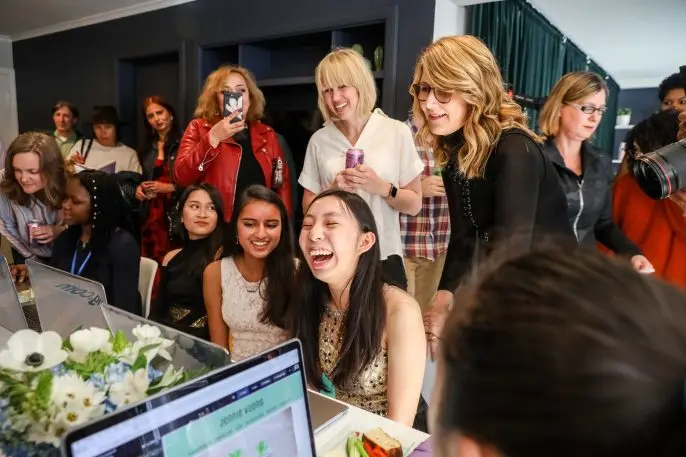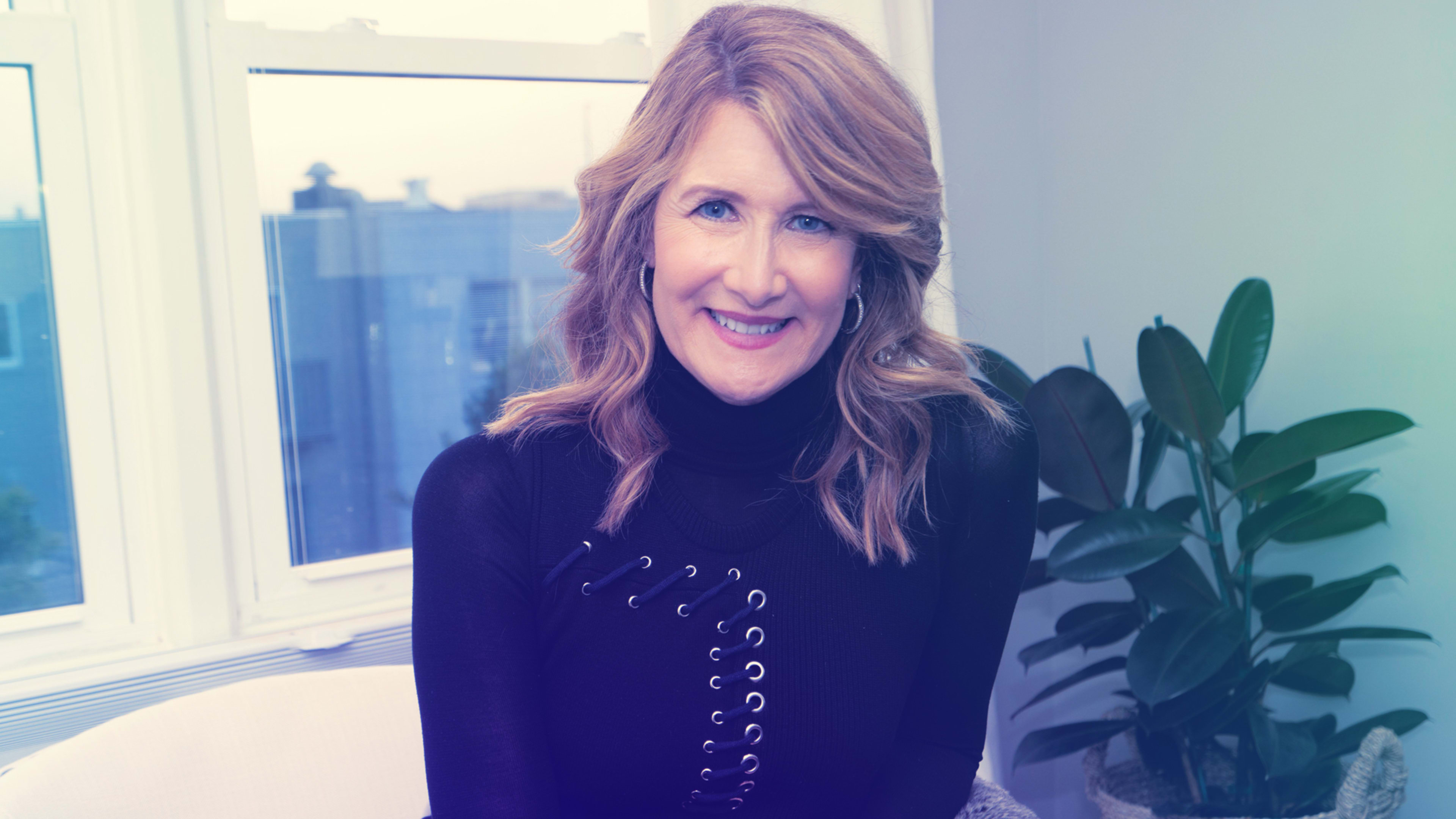The Emmy-award winning actress Laura Dern has long been active in women’s empowerment issues, and now she’s lending her voice to the Women in Coding movement. Dern spoke at the end of a two-day coding weekend in San Francisco on Monday for young women 16-19 years old, hosted by the travel e-commerce company Booking.com. The company also announced a new $350,000 scholarship fund that will be awarded to undergraduate women studying computer science at Spelman College and to postgraduates studying at Cornell University.
The tech industry has continued to struggle with a shortage of women in technical roles—gender balance in the overall workforce has improved, but only about 20% of technical roles are occupied by women. Dern believes that bringing the genders into balance in those roles is more than just a political issue; it’s also good business. I spoke to her shortly after the event Monday.
Fast Company: What do you think it is that’s keeping girls away from pursuing careers in coding?
Laura Dern: I just know across all the industries I’m finding, and I would think particularly in terms of tech and coders, there is a trepidation about whether they’re going to be invited. They feel like this generation already knows they’re there. There’s no part of them that’s going “I hope I get to.” And that’s where I think the paradigm shift is. They’re already in it, and they’re not only coders, they know that they can take it and it can inspire them into a million different worlds and they can be the owners of that content, not just staff. I mean, that’s like a new day. It’s really exciting. It’s like, “Oh, wait a minute, I don’t have to just be the actor for hire in the story. I can make the story.
FC: Here in Tech World we still have some challenges with diversity obviously, but with younger people, you get a sense that the lines are kind of blurring, and they feel like this is something they can do.
LD: Yes. As long as they don’t read Breitbart, they will feel that they have a right to be a STEM-interested girls (“STEM” is science, technology, engineering, and mathematics). Because I know there’s still some very archaic thinking around girls and science and math, but I think this generation of girls doesn’t care. And I feel like it’s inspired them even more. As my daughter said to me the other day, “Some people care that shame is the reason we’re going to get in the room, but I don’t care.” I said “Oh, what do you mean by that?” She said if it’s that they feel like they have to reach certain numbers to let us in the room (especially girls of color, and my daughter being mixed race), then great!
FC: I guess I’m hearing you say that it doesn’t matter the reason that women are getting into these positions in tech companies or any company. The thing is they’re getting in and then they can start making a difference.
LD: You know, Ted Sarandos, who runs Netflix, is a very good friend. And one of the great conversations I ever had with him was when I learned of the gender parity in his company and in the boardroom at Netflix and how many female executives work at that company. And I complimented him, and he was like, “What? Don’t compliment me for being smart. If my job is to make money for a company, I have representation making the decisions. If you want to make the most money possible, your consumer wants their voice heard, your consumer wants representation. They want to feel seen in that movie or in that tech company. They want that. And if you’re smart enough to have the people who are building your brand represent all the voices who you need to be your buyer, you’re going to make a lot more money.”
I’ve certainly learned that in the film industry. I mean, to have one boss on a feature film be of one race, ethnicity, or sex going “No, this is how young girls in college would be responding to this event in this movie” and giving script notes, you’d be like “Wait, what?” You want eight people weighing in with script notes, and everybody coming from a different world, and that’s how you’re going to get a larger audience to respond to your movie. So it’s for all of our industries.

LD: It seems terrifying, and it seems exhilarating at the same time. Particularly for Americans in the workforce, there’s already so much fear about job placement being scarce. Anytime there’s this fear of takeover in all our industries, it’s terrifying. But with technical advancement comes a workforce that’s needed to apply it. And so I think it’s just being hopeful that as we build, we grow a yearning for making a difference. Green energy is a perfect example. We need the wealth of information, and machine learning is going to support it, but it’s also going to create so much opportunity in the workforce. Because you can’t do it all with AI, and there’s going to be partnerships.
In film, too, I remember actors became so afraid with motion capture. We thought “Oh my God, we’ll be out of a job!” And now you see the seamless partnership right now between motion capture and the performance of the actor. Planet of the Apes is a beautiful example—one of the great performances of an actor [Andy Serkis], an actor who I thought deserved great accolades for his work. And we’ll continue to see that more and more. You can’t have the technology without the art.
FC: That’s particularly exciting to me because I guess I grew up in a time where there was kind of a separation between those two things.
LD: Yeah, me too. That’s a great example of how cool the blending of the two things. We made Jurassic Park, which was the first CGI movie. And I was on set with other actors, but my other scene partners, if you will, were Industrial Light and Magic, who had this new technology. And Dennis Mirren is going “I have this computer, and we’re going to PAINT in this dinosaur. I was like, what are you talking about? I mean, it sounded insane. And it was this great pioneering moment, with both their work—the guys at ILM, Jeffrey Light, Steven Spielberg, and Stan Winston (animatronics), and the actors and we were all working together to make this thing where dinosaurs were going to come to life. And it just was so exciting, but we couldn’t do it without the other. Yeah. And that was beautiful. You know, that was like really, really fun. So you hope that with machine learning—particularly in the world of science and medicine—that it’s going to be a beautiful fusion of brilliant minds and technology.
FC: When we look at advancing in this area and getting more girls involved, is there a role for government to play?
LD: It’s a travesty when you travel through the rest of the world and you hear about the grants and supported free education. We have brilliant thinkers and inventors waiting to find the cure for Parkinson’s or Lou Gehrig’s disease, and they may never get the education or the opportunity to do that. We’re all losing lives and family members because of that travesty. So, more than anything, we would hope that this would be the primary focus of the U.S. Government. This is the workforce. This is the answer to our prayers. It’s the protection of our environment. And those minds are just longing for us to give them a chance to come up with saving us.
How wonderful that we have companies like booking.com, but why are we waiting? Why do [they] have to be the leader to do this for young women? And the government should be doing it for themselves, because the voter is the buyer again, right? You’ve got a commodity to sell, and the buyers are saying, we want our party to look diverse and interesting now. So where’s the representation? And women are coming out of the woodwork, thank God, to say, Hey, I’m going to run for local government, I’m going to run for Congress. So the government would be investing wisely in themselves by bringing up the next generation of women for a cause.
Laura’s comments were lightly edited for brevity and clarity.
Recognize your brand’s excellence by applying to this year’s Brands That Matter Awards before the early-rate deadline, May 3.
